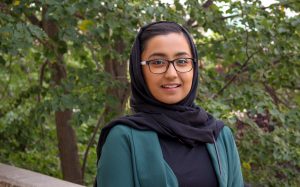
In today’s email communication from the U of R President Dr. Thomas Chase, faculty and staff were made aware that,
“Alumna and current #UofR Education grad student Aysha Yaqoob (BEd’18) is talking to young people about climate change.
Laura Lynch of CBC’s ‘What on Earth’ January 10 broadcast, a segment on talking with children about climate change, features award-winning U of R alumna and current MEd graduate student Aysha Yaqoob, who teaches at Balfour Collegiate in Regina.”
This interview is summarized in the what follows.
Lynch asks, “Why teach climate change in an English class,” Yaqoob outlines how her teaching practices were formed by her own experiences as a student, and what stuck with her were the things she could relate to. So when she thinks about making learning relatable, she thinks about “bringing in real-life situations: what’s going on around them, [and] how they can contribute to it.” Yaqoob says, “I’ve learned that climate change is something young people really care about.”
Lynch then asks Yaqoob how teaching about climate change in a high-school English class “dovetail[s] with lessons about Shakespeare and grammar.” Yaqoob responds that the Saskatchewan English curriculum is thematic so quite open ended. The theme she builds around is Equity and Ethics, which ties into Shakespeare’s Macbeth and also climate change and climate crisis. Yaqoob begins by asking students where they are at and what they already know about this topic. Yaqoob says, “Over the years, I have found that that’s usually the best way that we can start our learning and move forward.”
Students often think they know a lot about a topic but after their conversations, they realize “they only understand the tip of the iceberg,” says Yaqoob. Students are generally familiar with concepts such as reduce, reuse, recycle, and plastic straws, but with “some of the more complex conversations such as greenhouse gases, when we bring those in, a lot of kids are shocked,” Yaqoob says. “We are constantly debunking information or misinformation that they find online. That’s actually part of the course that I teach earlier on, that critical thinking piece, so by the end of it, they get pretty good at cross referencing, fact checking…so it’s a pretty cool experience that we do together.”
In her first year of teaching, Yaqoob realized that she needed to approach the topic differently so the students can feel empowered and inspired rather than panicked. After conversations with students, she and her students started to look at people who are making change, such as youth activists. Students wrote to people who were making decisions, such as the Mayor of Regina, the Provincial Government and the Prime Minister Trudeau. Students did receive responses, and these contributed to a feeling of empowerment and advocacy.
Go to https://www.cbc.ca/listen/live-radio/1-429/clip/15817583 to hear the 7-minute exchange. Select the 10 January segment of “What on Earth” and forward to about the 12’15” mark.
Follow us on social media